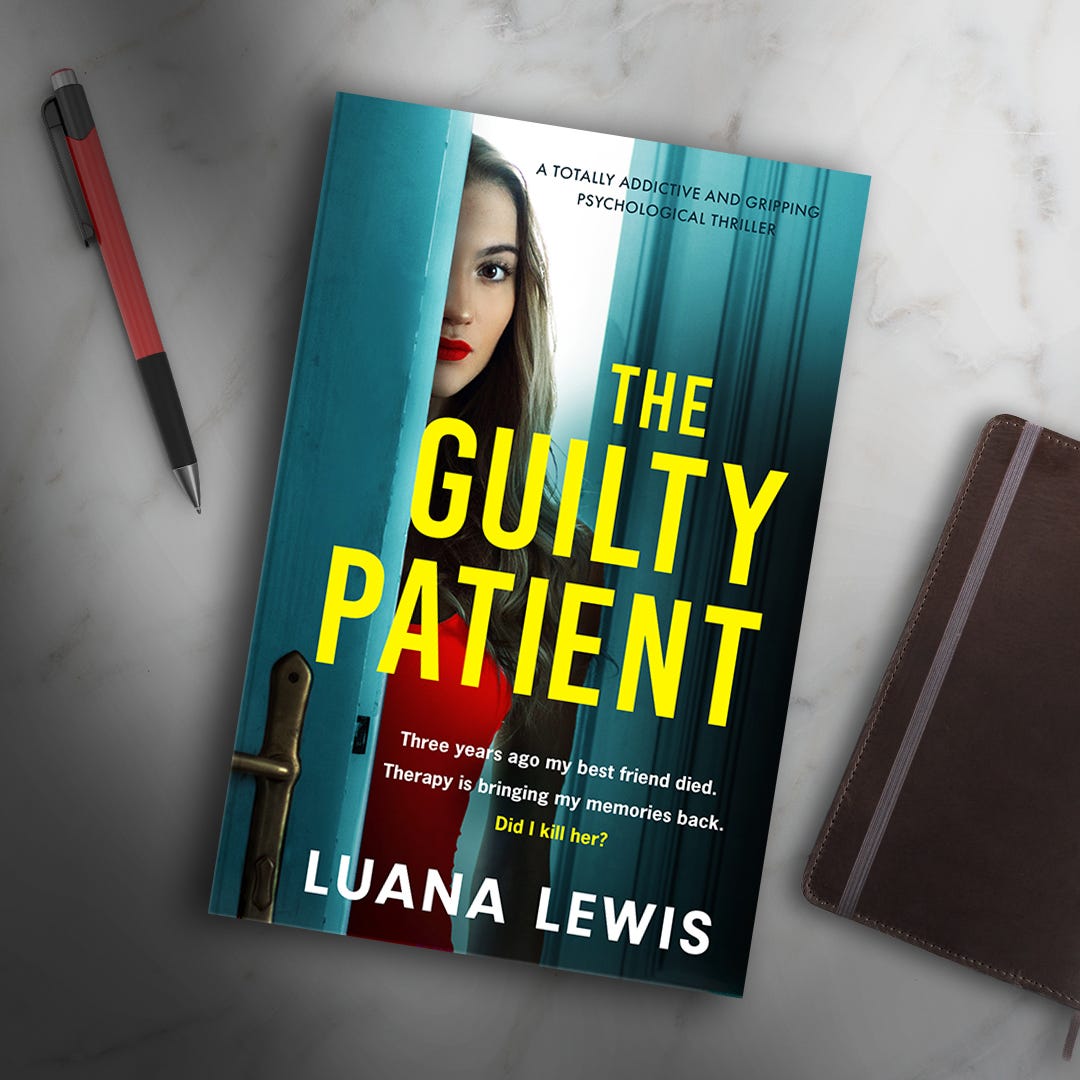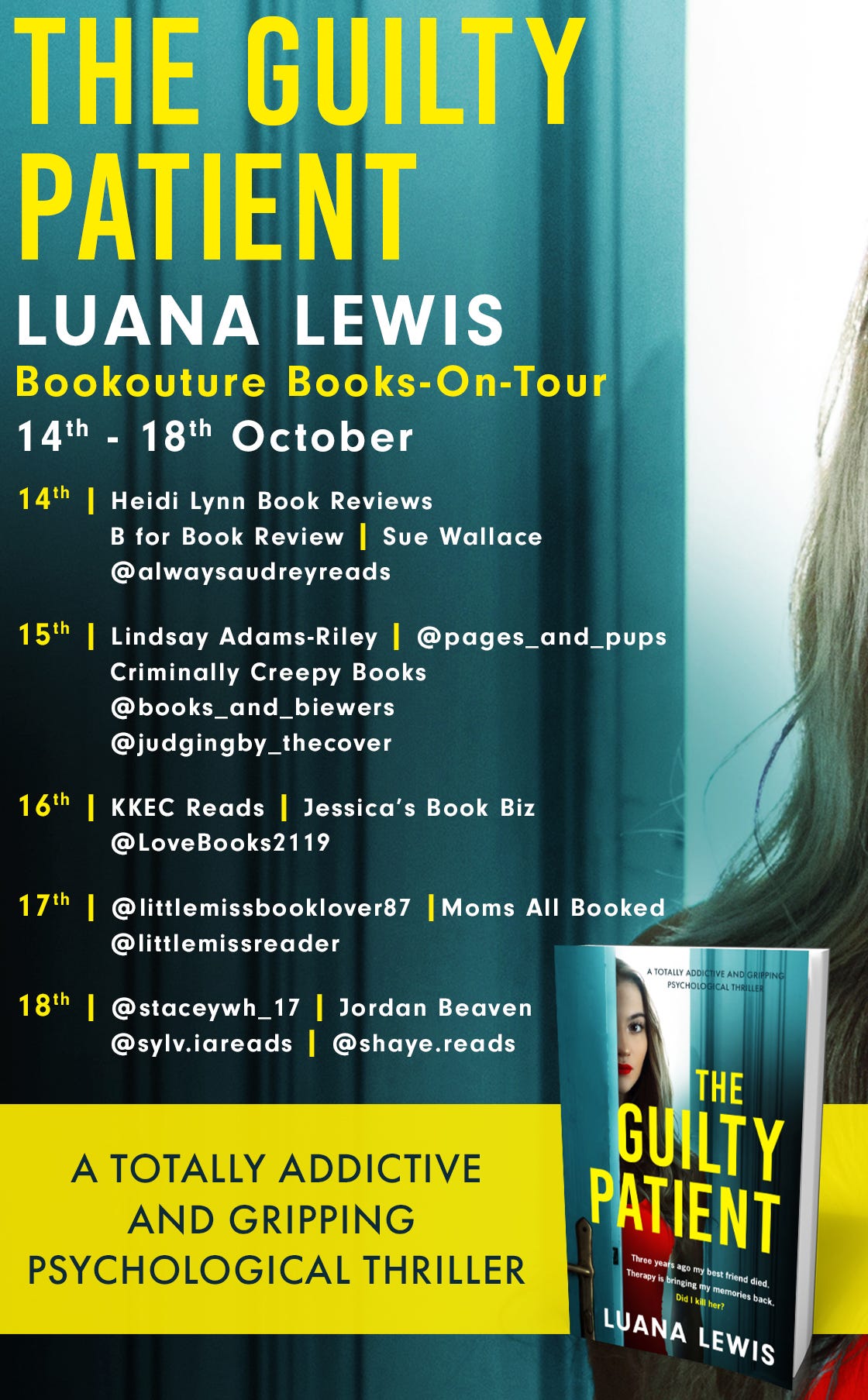Book review: The Guilty Patient by Luana Lewis
Fragile memories, guilt, and the distortion of self
Genres: Popcorn thriller, domestic suspense, psychological thriller
The Guilty Patient by Luana Lewis is not just a whodunit murder mystery; it is a study of the human psyche, the fragility of memory, and how trauma can distort both our recollections and sense of self.
Here are my thoughts:
Let’s drop the synopsis:
I take a deep breath before I utter the words I’m terrified to speak out loud. My therapist waits, but nothing could prepare her for what I say next. ‘I think I killed my best friend…’
Three years ago, Alice and I went away for a fun weekend with our big group of friends. But at the end of the trip, police cars flooded the house where we were staying. Alice had been found. Dead. And no one knew what happened to her.
I’ve tried to remember the lost hours before her death, but only snapshots appear in my mind – Alice’s silk scarf, given to her by a secret boyfriend, the silly argument we had when she refused to tell me, and her relationship with Tom, the man who would later become my own husband…
Now, as I talk to my therapist, my heart pounds in my chest. Because I’ve had a breakthrough. And I start to remember that I was there when Alice took her last breath. I was standing over her… could I be her killer?
As my therapist begins to question all our friends, one thing becomes clear – we all have a different version of events. I’m certain someone close to me is keeping a deadly secret. How can I believe anyone around me, when I can’t even trust myself?
CCB thoughts:
Before we get to it, it’s worth noting that the character, Dr. Tara Black, first appears in The Perfect Patient, Lewis’ previous novel. There's no need to worry if you haven’t read it - the narrative in The Guilty Patient stands firmly on its own and can be enjoyed as a standalone thriller.
Popcorn thrillers are like the blockbuster movies of the book world - fast-paced, full of adrenaline, and designed to keep you hooked. These stories thrive on twists, with quick, punchy chapters that make them hard to put down. You won’t find deep philosophy here, and sure, they might be more about thrills than subtlety, but sometimes that’s exactly what you need. The Guilty Patient by Luana Lewis delivers this in spades with an enjoyable read you’ll get through in a few sittings.
At its core, The Guilty Patient is a psychological thriller that explores issues concerning fractured memories, guilt, deception, and self-doubt. Rooted in her experience as a clinical psychologist, Lewis does a commendable job of pulling the reader through a maze of unreliable narrators, red herrings, and untrustworthy characters.
The story follows Mia. Heavily pregnant, she is battling with the terrifying possibility she killed her best friend, Alice, three years earlier. The problem? Mia can’t remember what happened. All she has is snippets to form her version of events. “I think I killed my best friend,” Mia boldly states to her therapist, Dr. Tara Black, during their first meeting. Traumatised, Tara is intent on unearthing the truth. Together, they try to de-mist Mia’s memory and recover the events of that fateful night.
These sessions aren’t easy on Mia. Her mental health starts to crumble and her behaviour becomes increasingly heightened - borderline erratic. She becomes confused, aloof, conflicted, and dissociative. Tara is understandably concerned, and before long, she is embedded into every facet of Mia’s life (inappropriately so, I would argue). The duo slowly begin to discover more than what they bargained for.
Mia is a deeply complicated character, haunted by her past and the uncertainty of her role in Alice’s death. She’s plagued with guilt and self-doubt, struggling to piece together her fragmented memories, fearful of the reliability of her thoughts. Can they be trusted? Could they be false? Did her previous therapist, Caroline, plant them? Mia is torn between a desire for the truth and fear of what that truth might actually reveal.
The weight of Alice’s death isn’t all Mia has to battle. She is also shaped by unresolved childhood issues, particularly her relationship with her mother. This plays a role in her inability to connect with her pregnancy. Sadly, Mia seems detached and in denial about her baby's impending arrival. This, in turn, affects her relationship with her husband and mother-in-law, who are understandably deeply concerned. It could be suggested Mia’s unexcited, almost aloof attitude towards motherhood mirrors her fractured upbringing, further cracking her already fragile mental state, so much so that she starts to question her ability to be a mother. And this is heartbreaking to read. Mia can’t take much more. She starts to become desperate. She starts making unwise decisions and puts herself in dangerous situations. She even ends up face down in a freezing river.
Tara, Mia’s therapist, plays a pivotal role in unravelling the layers of trauma and guilt that burden Mia. She is more than just a detached observer; she actively helps Mia unlock the fragmented memories surrounding Alice’s death while battling her own painful past, including the murder of her parents and the disappearance of her brother. Tara’s personal battles inject a secondary storyline into the novel for the reader to follow. This parallel journey bonds our two protagonists together - akin to a sisterhood - and creates an intriguing dynamic between the two women as they search for answers, at war with their inner demons.
Therapy is not merely a backdrop but central to the story's structure. It is an anchor point for Mia, who leverages Tara’s professional role as a stabilising force to keep her grounded. Tara ticks all the right boxes. She asks challenging questions and creates a safe space for Mia to speak freely. Therapy as a practice plays a central role within the story, and while these sessions offer crucial insights into Mia’s mind, it is done so in a way that doesn’t feel overly expositional. Tara may be the therapist, but Lewis avoids serving her only as a mouthpiece and instead develops a strong character in her own right.
However, the therapist/patient dynamic does cross a line, in my opinion. It inches into inappropriate territory as Tara inserts herself into Mia's everyday life. Moved by the similarities between the two women, Tara takes a great interest in Mia’s plight and unintentionally complicates matters. She turns up at Mia’s place of work and integrates herself into the family. It doesn’t feel malicious, though, and instead expresses Tara’s caring and nurturing attitude - albeit misguided at times. Tara checks in with herself more than once, remembers her boundaries, and pulls back. Commendable? Sure. Nevertheless, my therapist has never followed me to an empty summer house…
Then there’s Alice. She is portrayed as the quintessential perfect friend - charming, beautiful, and adored by everyone around her. Yet, beneath her polished exterior lies a darker, ruthless side. While she attempts to make amends before her mysterious death, her efforts come too late. Was Alice’s tragic end a result of her actions? Or inevitable due to the secrets that festered beneath her radiant facade? Her duality serves as a chilling reminder that even those who seem ‘perfect’ can harbour shadows, making her death a haunting mystery that leaves the reader grappling with unanswered questions.
It’s not just Mia, Tara, and Alice that make up the ensemble of complex characters. There are many with their own plotlines to get our heads around. For example, there’s the concerned husband, kind-hearted mother-in-law/gallery owner, suspicious father-in-law, secret boyfriend, allusive missing brother, and traumatised army veteran, to name a few. For example, Tom, Mia's husband, is particularly intriguing; his past relationship with Alice and now marriage to Mia creates a slightly odd emotional/love triangle. His ambiguous behaviour sometimes leaves readers wondering whether he knows more about Alice’s death than he reveals.
One of the novel's most compelling elements is its exploration of memory as an unreliable narrative device. Mia's recollections of the weekend leading to Alice's death are revealed in scattered fragments - vivid images of Alice’s silk scarf, their silly argument about Alice's secret boyfriend, and, of course, the complicated situation with Tom. These hazy, distorted snapshots provide tantalising clues, leaving the reader constantly questioning what reality is and what is just fiction.
Now, a warning. The Guilty Patient has multiple tentacles - there is a lot going on. It is made up of many differing versions of events and secondary storylines. There are a lot of red threads to follow. I don’t mind this; however, for those who prefer a more linear narrative, the story may sometimes feel a little convoluted and difficult to keep up with. For example, there's Tara’s personal battle, Alice’s backstory, Mia’s in-laws and gallery owners, the story of the mysterious therapist Caroline, Tom’s brother’s PTSD, and Mia herself. Coupled with various time hops, it’s understandable that some readers may find the plot jarring and overly complicated, even when the thread ends loosely come together at the end.
That said, the short and snappy chapters made the reading experience feel brisk and engaging. When I thought I had a handle on what had happened, fresh insights would emerge, causing me to reassess my theories - a hallmark of a solid popcorn thriller.
And the ending? The novel's final act delivers a satisfying conclusion. That’s all I shall say about that.
Overall, The Guilty Patient is a solid domestic thriller and suspense that explores the human mind's dark corners and how guilt and trauma can distort reality. Yes, it’s jam-packed, which may be its downfall for some, but fans of thrillers such as The Girl on the Train will appreciate its links to unreliable memories and the haunting power of the unknown within one’s own mind.
Recommended for fans of:
Authors such as Freida McFadden, Fiona Barton, and B.A. Paris
Books such as The Silent Patient by Alex Michaelides, Gillian Flynn’s Sharp Objects, and The Girl on the Train by Paula Hawkins
Popcorn thrillers with flawed, unreliable narrators at its core
Content warnings:
Mental health, coercive control.
Buy the book:
You can purchase The Guilty Patient here and at your local bookstore.
Publisher: Bookouture | Page count: 292
Discover what others thought:
Thank you to Bookouture for inviting me on this book tour and for allowing me access to the book via NetGallery in exchange for an honest review. All thoughts and opinions are my own.
About the author:
Luana Lewis is a clinical psychologist and writer of crime thrillers. Her fiction is inspired by professional experience. A specialist in anxiety disorders and teacher of advanced psychotherapy, she has worked in the NHS and at a specialist clinic for trauma victims. She now writes and runs a private practice in the London area.
Will you grab a copy of The Guilty Patient? If you do, please let me know what you think in the comments below.
As always, happy reading!
Until next time,
Sian | Criminally Creepy Books






